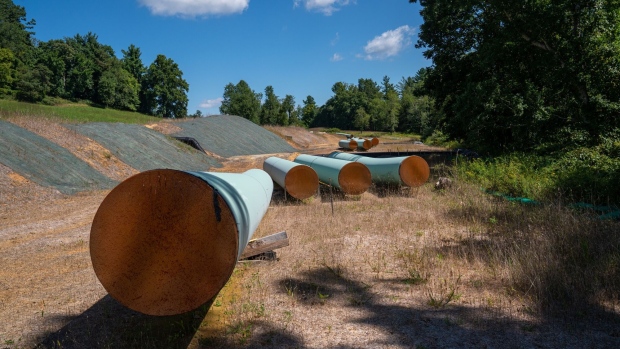Oct 3, 2023
Mountain Valley Pipeline Gets New Safety Measures Under US Order
, Bloomberg News

(Bloomberg) -- Equitrans Midstream Corp., the owner of the controversial Mountain Valley Pipeline, has agreed to new safety measures after federal regulators ordered a review of the project, arguing segments left buried underground or exposed to the elements during years of delay could pose a safety risk.
Under terms of an agreement with the US Pipeline and Hazardous Materials Safety Administration, Equitrans will be required to submit a remedial work plan and conduct tests on coatings designed to prevent corrosion, and for pipeline damage.
Equitrans, in a statement Tuesday, said the agreement is “not expected to have material impact” on the project’s cost or schedule.
Read More: US Says Mountain Valley Pipe May Pose ‘Risk,’ Orders Testing
The agreement comes after PHMSA ordered the company in August to undertake a series of safety inspections on the $6.6 billion project in a notice that raised the prospect of “risk to public safety, property and the environment” if the pipe were commissioned without potential corrective safety measures. Environmental groups had raised alarms to PHMSA that pipes were at risk and could result in a catastrophic failure.
The pipeline, which is about 94% complete, will provide drillers in the gas-rich Appalachian Basin with much-needed transport capacity. The roughly 300-mile (483-kilometer) pipeline, backed by Democratic Senator Joe Manchin, cuts through the Appalachian Mountains, a national forest and hundreds of stream crossings. The West Virginia Democrat succeeded in having language approving the beleaguered project woven into the legislation that was needed to lift the national debt limit.
The order could benefit Equitrans by providing the company with a way to rebut arguments that construction was taking place without adequate oversight, analysts said.
“We consider this positive news for MVP. With the consent order in hand and the stance that they can still make their target, it is up to them to deliver as planned,” said Christi Tezak, a managing director with Washington-based consulting firm ClearView Energy Partners. “This is a voluntary agreement so MVP would have little reason to agree to something it couldn’t do.”
©2023 Bloomberg L.P.








